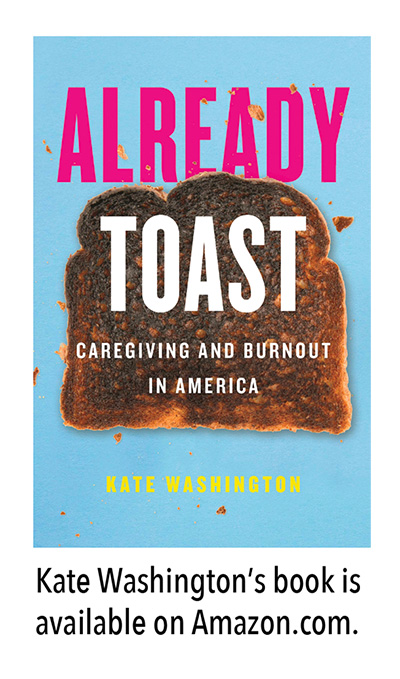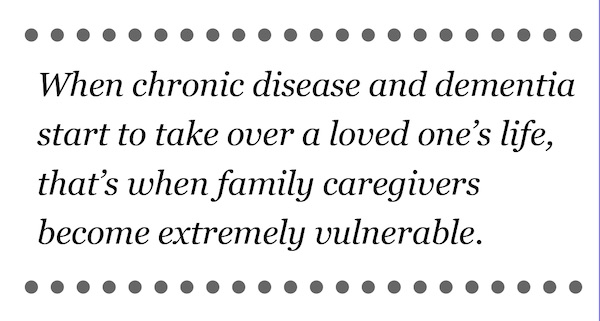Family caregivers are exhausted — physically, mentally, and emotionally. They start healthy. They’re working full-time and caring for a family member part-time. Driving mom to a doctor’s appointment, restocking her refrigerator, taking her to a friend’s house for the afternoon are relatively easy tasks and provide quality time to catch up. Light duty, easy, sometimes fun. But when chronic disease and dementia start to take over a loved one’s life, that’s when family caregivers become vulnerable. Their health declines. Many become depressed. Many leave their jobs.

This happened to Kate Washington. She was at ACC in February to talk about caregiver burnout. Kate is a food writer and former restaurant reviewer for the Sacramento Bee. She has a Ph.D. in English from Stanford University. She and her husband Brad have two children and were having a good life. But when Brad was diagnosed with cancer, everything changed, including the nature of their relationship. Brad became the patient, and she was his caregiver. Kate took on a new full-time job for which she had no training. She coordinated treatments, administered IV drugs, cleaned commodes, managed medical appointments, and dealt with insurance companies. Kate kept Brad alive, but she was crumbling inside. On top of being a caregiver, Kate still had to be a dutiful mom and wife. She spoke at ACC about her experiences and her book, “Already Toast, Caregiving and Burnout in America.” The title speaks for itself.
Kate is in her late forties. Now imagine someone in her 80s thrust into the role of caring for a spouse with dementia, chronic illness, or a disability with no outside help. How is this humanly possible? Yes, we all know someone in this predicament. As Kate wrote about in her book, this is a problem that communities all across America face. In the world’s wealthiest country, unpaid family caregivers live in a society that provides very little structural support. Many of us in the ACC community can relate to this all too well.

So, why not just hire a professional caregiver or move your loved one to assisted living or a skilled nursing facility? It is not that simple. For many people, these options are not affordable or desirable. Many families can’t even agree on what’s best for mom or dad at this point. Families struggle and enter into conflict when deciding what’s best for their loved one. In the meantime, the loved one and the person doing the primary caregiving suffer. Despite all the services that our government, healthcare providers, and insurance companies seem to provide us, very little is done to help the family caregiver. That’s where ACC is making a difference.
For family caregivers facing burnout, in-home respite care goes a long way to helping them avoid burnout. At ACC, we send a volunteer or “friendly visitor” to a home, so that the family caregiver can take a short break, recharge, and do other things away that are important and meaningful. Accepting respite care reminds the family caregiver of the adage, “to help someone, you have to help yourself first.” Here’s another way to visualize this. When you are on an airplane and the oxygen masks drop down from the overhead compartment, you put your mask on first then assist your child.
ACC’s friendly visitor is there just to talk to the care receiver, watch TV together, read the news, play cards, or go for a walk. He or she doesn’t have to do house chores or personal care. He or she is there just to provide companionship and safety supervision. What a difference this volunteer makes. Everyone’s quality of life has improved!
As the saying goes, “It takes a village to raise a child.” Likewise, it takes a community of caring to support us as we age. The Friendly Visitor and In-Home Respite Program at ACC is looking for volunteers who want to make a difference in people’s lives, including their own. It is deeply satisfying work. All of us need respite and companionship at different points in our life. The need only increases with age.


Add a Comment